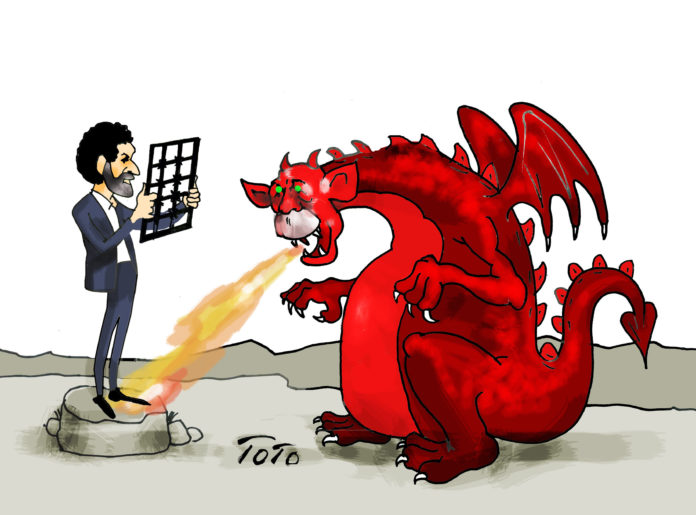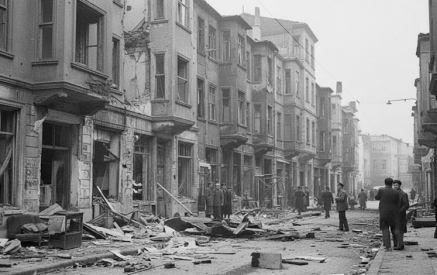by Edmond Y. Azadian
The Armenian Mirror-Spectator
Since the beginning of the Cold War, Turkey has been the beneficiary of the East-West confrontation. The oft-used phrase that Turkey was a bulwark of democracy against Soviet expansionism is a euphemism for the actual mission that Ankara had been tasked to perform; that is, to do the dirty work that the West would not want to do openly, from the Korean War, all the way to the Arab Spring.
In the meantime, Ankara built up its military force and developed its economy to the point that today it can challenge its erstwhile benefactors.
Read also
The largesse of the US, particularly, towards Turkey, has been phenomenal. But today, Turkey is on a collision course with the US on the issue of values and politics.
For Recep Tayyip Erdogan’s Islamist AK Party (AKP), religion is a potent component for control and governance of the fanatical masses. Weaponized religion is equally effective in both domestic politics and foreign adventures for Erdogan.
Since the 2016 attempted coup in Turkey, Erdogan has jailed hundreds of thousands of judges, military personnel and intellectuals, who have divergent views on Turkey’s future, to consolidate his power internally while externally playing the role of the champion of the Islamic world, rallying support from respective nations.
Therefore, yesterday’s bulwark of democracy has become today’s spring of despotism, precipitating a confrontation with the value systems of the Western nations, which had believed that modern Turkey would become part and parcel of the Western democracies.
The confrontation between Turkey and the West has been simmering for a long time and the recent crisis over 10 ambassadors seeking the release of philanthropist and businessman Osman Kavala from jail laid bare the deep deterioration of relations.
Like Hrant Dink, Osman Kavala has a vision for a progressive Turkey, one at odds with Erdogan’s medieval philosophy of governing a country.
“What has taxed Mr. Kavala and his friends the most in the 29 months since his incarceration is the question of why he has been singled out so harshly. The answer may be simply everything he stands for,” wrote Carlotta Gall in the New York Times back in April 2020, while Steve A. Cook adds in an article recently published by the Council of Foreign Relations, “Kavala himself is no threat to Erdogan, but he does represent a vision of Turkey that threatens Erdogan’s long-term effort to force a country in the image of the ruling Justice and Development Party (AKP).”
In the politicized justice system of Turkey, Osman Kavala has been pushed around from one court to another with absence of evidence, on charges jumping from terrorism, to Gulenism and Sorosism.
In fact, he is a benefactor who founded the Anadolu Kultur Foundation to study and value the many cultures of Turkey’s minorities, which have inhabited Anatolia for over a millennia.
Kavala’s drive contradicts the narrative that the Turkish government and historians have been feeding Turkey’s population that the Turks have inhabited the region since time immemorial and that no other ethnic group is indigenous to Anatolia.
With Kavala’s incarceration, Turkey was sliding down into a dark alley, when 10 ambassadors accredited in Ankara, appealed to Erdogan’s government to end the charade and to release Kavala, whose case has already become an international cause celebre.
Those ambassadors represented the United States, France, Germany, Canada, Finland, Denmark, the Netherlands, New Zealand, Norway and Sweden.
The angered President Erdogan, who ordered Foreign Minister Mevlut Çavusoglu to begin proceedings to expel all 10 from Turkey as personae non grata.
Referring to the envoys’ calls for Kavala’s release, Çavusoglu said, “This statement was unacceptable. It included instructions to the [Turkish] judiciary. I told my friends to make them [ambassadors] know their place.”
This diplomatic row could have escalated further and damaged Turkey’s relations with its allies, but a solution was found out of the impasse, ironically, not by the Turkish government, whose economic interests were at stake, but by the ambassadors themselves.
The US ambassador extended a legal olive branch, in the shape of a statement which called for non-interference into Turkey’s internal affairs based on a UN convention.
This was a victory for President Erdogan, who exclaimed, when answering a journalist’s question: “How did I take a step back? I am on the offensive. There is no backing down in my book.”
Mr. Erdogan may brag about his “offensive,” which cannot go too far, because the next hurdle facing it is the ruling European Convention on Human Rights, which has determined that “the prolonged pretrial detention of Kavala was in violation of the convention’s rules” and it has ordered Kavala to be released by the end of November, otherwise Turkey may face expulsion from the convention.
That may not bother the defiant Erdogan too much, but Turkey’s population will further slide into the dark ages.
Turkey violates all of the rules of the European Union, and still clamors to join that union.
However, the ambassadors’ crisis is only the tip of the iceberg in the problems pitting Turkey against the West.
Last September, when President Erdogan was attending the UN General Assembly in New York, he was shunned by President Biden. It is on the record that there is no love lost between the two. Before his election as president, Mr. Biden had characterized Erdogan as a despot, and voiced support for his political opposition.
In his turn, Mr. Erdogan had publicly complained that relations were more sour with the Biden administration, when he enjoyed a carte blanche from the Trump administration.
Despite all these misgivings, President Biden met with President Erdogan in Rome this week for 70 minutes, on the sidelines of the G-20 Summit. It was a closed session, which allowed each party to present the outcome the way they chose. The Turkish side claimed that it was positive and constructive but reviewing all the agenda items, one can surmise that the meeting was anything but “positive.”
Thus, after paying some lip service to Turkey’s partnership in NATO, the US side expressed its displeasure over the purchase of S-400 Russian missiles.
They also covered all the hot spots and there is no indication that any agreements were reached. Syria was on the agenda, and Erdogan has complained about US support for Kurdish forces fighting ISIS.
Other thorny issues included the election in Libya, Turkey’s aggressive posture in the Eastern Mediterranean, Afghanistan and the turmoil in the South Caucasus. This last is the region where Ankara is in cahoots with Russia to keep the US and the West out. Russia and Turkey have been promoting the 3+3 format for the resolution of the conflict in the Caucasus, to negate the role of the Organization for Security and Cooperation in Europe (OSCE) Minsk Group.
Turkey’s foreign policy follows a pattern to relegate all unsolvable issues to a joint committee, through which Ankara hopes to wear down its interlocutors. We should all remember that the same joint committee idea was offered to Armenia to tackle the Genocide issue. The fact that Presidents Erdogan and Biden have concluded their meeting, leaving the problems to a joint committee, means a whole host of unresolved issues remain between the two sides.
Another issue is that of armaments and military planes. After Turkey was ousted from the F-35 fighter jet program, Erdogan pinned his hopes on purchasing 40 F-16 fighter planes with another 80 repair kits. The Turkish side came out of the meeting optimistically while President Biden insisted that the program has to go through the congressional process, where it has many opponents.
Parallel with the Biden-Erdogan meeting, some background voices amplified the divide and warned of more troubled days ahead.
One is the posturing of Washington’s new Ambassador to Turkey, Jeff Flake, and the other is Erdogan’s domestic opponent, Kemal Kilicdaroglu.
During the Senate hearings, Flake warned Turkey and Erdogan, stating, “Any purchase of additional Russian weapons will result in additional sanctions. We will hold Turkey responsible.”
He has also used some pointed terms like the “Erdogan regime,” “oppression,” “democratic backsliding.”
“Our relations with Turkey are facing deep challenges,” he said.
Alarmed, Mr. Kilicdaroglu responded to the new ambassador’s statements: “Did they say ‘Bring Turkey in line again, and turn it into Syria? Did they say ‘Stop Turkey, and if you cannot stop it, suffocate it through terrorism?’ So Mr. Flake, is the coup process, which Biden refers to by saying ‘we will back the opposition and oust Erdogan’ be launched by you?”
Mr. Erdogan’s bullying may intimidate his opponents at home but on the global scene, may generate the adverse impact.



























































